Freight Bill Audit & Payment: The Key to Supply Chain Clarity

Amid rising tariffs, disruptions, and increasingly intricate supply chains, freight bill audit and payment providers are emerging as key partners—unlocking efficiencies with
data-driven insights that transform complexity into clarity.
The freight bill audit and payment (FBAP) market continues to evolve amidst broader economic shifts, including fluctuating tariffs and interest rates, inflation, advancing technology, and changing freight demand, says Scott Burglechner, senior vice president and head of freight payment product management with U.S. Bank. Given a continually changing business environment, shippers increasingly are looking for FBAP firms to offer more than standard audits.
“They’re seeking deeper cost savings, advanced spend management, and support for all modes of transportation,” he says.
The worlds of transportation spend management and freight bill audit and payment are blending together, adds Craig Cameron, chief marketing officer with A3 Freight Payment. “Historically, transportation spend management was the realm of high-priced consultants,” he says. Now, many FBAP providers can provide both the technology solutions and insight companies need to effectively manage their transportation spending.
Often, shippers have been told a transportation management system (TMS) is a one-size-fits-all solution. “The reality is that shippers of all sizes face challenges, but not every one needs—or has the budget for” these solutions, says Luther Brown, chief executive officer at nVision Global.
In discussing their pain points, however, it often becomes clear that many shippers need a strong freight rating solution. Providers need to be creative and design configurations that address each customer’s specific requirements, as the right rating solution can empower shippers to optimize freight costs and lay the groundwork for future efficiencies.
The technology shift capturing attention in the FBAP sector is the growing role of artificial intelligence (AI). Much of this stems from organizations’ desire for real-time information analysis. “People want to know what AI can uncover that they’re unaware of and that could turn around and bite them,” Cameron says.
Many freight payment customers also are exploring AI use cases to improve operations. Companies seeking to streamline processes and automate workflows look to AI to accelerate digitized self-service, enable more intuitive interfaces and data outputs, and facilitate API integrations that help retire legacy EDI systems.
Guiding AI Initiatives
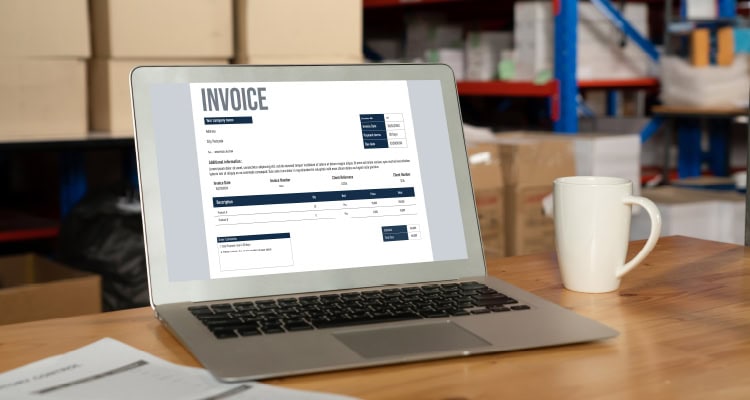
Freight bill audit and payment providers offer creative solutions and design configurations that address market trends and shippers’ specific requirements.
Still, the role AI can play in FBAP remains uncertain. “The advent and rapid growth of artificial intelligence and machine learning have streamlined some functions, while also propelling too much trust into algorithms that do not understand shipping nuances,” says Dani Funk, Senior Vice President-–Sales, Marketing & Organizational Development at Trans Audit. The firm is seeing over-reliance on AI alongside less focus on rate- and contract-related discrepancies, she notes.
It may be three or four years before AI initiatives yield cost reductions, says Allan Miner, CEO of CT Logistics. High expenses and the need for resources to define model goals make it clear: “It’s not just flipping a switch,” he says.
For AI solutions to be effective, organizations also need a solid freight bill audit and payment process with credible data, Cameron explains. And once an AI solution is up and running, the organization needs experts who can validate the information it is producing.
Even when an AI solution uncovers steps a company could take to improve operations, the organization may lack the resources needed to implement the changes. For example, a company may be incurring $50,000 in charges for address corrections each month. The expense may be sizable, but given more pressing business priorities, it may not be significant enough to dedicate resources to resolving it. This challenge likely will become more pronounced as AI begins to identify greater numbers of cost-saving opportunities, Cameron adds.
Tariffs Capture Attention
Along with AI, tariffs are on the minds of many FBAP providers and their clients. Some shippers are changing suppliers, at least temporarily, to minimize tariff costs. This can impact the audit process, especially if a company is shifting from negotiated rates to spot quotes, often because they’re not sure how long they’ll continue sourcing from a new company or location, Cameron explains. It’s possible that once things settle down, more companies will revert to negotiated rates with specific carriers, he adds.
The convergence of tariffs, disruptions, and today’s generally complex supply chains is prompting companies to focus on costs and visibility, says Michele Vernola, vice president of parcel spend management with CTSI-Global.
Some costs, such as tariffs, are largely outside shippers’ control. “We’ve got to pivot and focus on the expenses we can control,” she says. With visibility into their supply chains, companies are better positioned to do this.
As supply chain disruptions continue, the number of things that can go wrong with any shipment remains high, potentially impacting everyone across all modes of transportation, adds Hannah Testani, chief executive officer with Intelligent Audit. And as supply chains become more complex, with more carriers and modes, the variance in companies’ data increases, she says.
“FBAP companies play a critical role in helping shippers turn that complexity into clarity, working alongside them to anticipate risks, uncover efficiencies, and build more resilient operations,” she adds.
A3 Freight Payment: A Different Approach And a Better Result
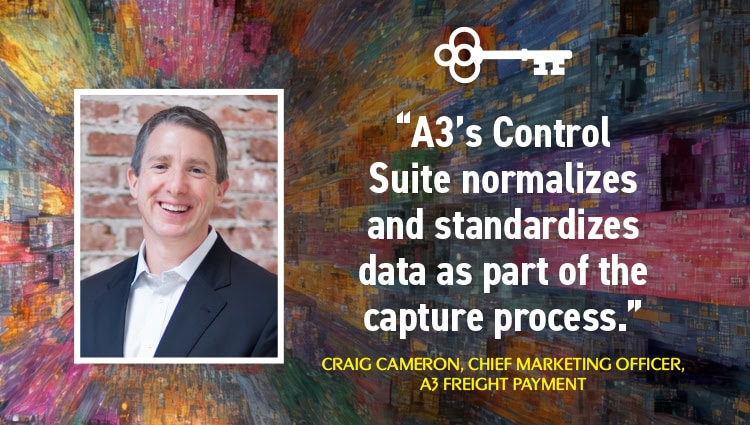
Transportation spend management is the sole focus and core competency of A3 Freight Payment, Cameron says. A3 provides customized, comprehensive freight spend management solutions that leverage information, cutting-edge technology, and industry expertise to help organizations manage their transportation spend.
A3 works with clients to create a custom solution that provides support where they need it. Shippers with large transportation or supply chain organizations may not need reporting and analysis support as opposed to those with limited resources. Regardless of size, all companies can benefit from the insights AI can reveal.
A3’s reporting platform, Control Suite, is utilized to manage the freight payment process and offers data visualization and analysis that incorporates AI technology, Cameron says. Historically, when companies used traditional freight bill audit and payment data to conduct analyses, they ran into challenges with data quality, which required a shipper to manipulate data before they could conduct meaningful analysis.
“A3’s Control Suite normalizes and standardizes data as part of the capture process,” Cameron says. Clean data is mandatory to effectively leverage the power of AI.
Once A3 has identified potential cost-saving opportunities for a client, it will follow up to see how it can help the company achieve the savings, Cameron says. For example, different vendors’ procedures might inadvertently increase the client’s expenses, but the client might lack the personnel needed to address them. “We’ll tailor our technology, solutions, and human resources to the customer’s needs to enable the client to achieve those savings,” Cameron adds.
A3’s solutions incorporate both technology and human expertise. “The technology gets you only so far,” Cameron says. Even when leveraging technology, organizations still need experts to validate the results and implement changes, he adds.
Automating to Cut Costs
A3’s transportation spend management services team currently is working with the procurement function of a company in the automotive industry. The company had been incurring chargebacks, because it was sending collect shipments to its customers, but the customers weren’t paying for them. Instead, the shipments were being billed back to the company. A3 developed an automated process that identifies these shipments and allows the company to bill customers for these records, resulting in more than $500,000 in savings.
A3 is also evaluating the same company’s routing compliance, identifying areas in which company processes are noncompliant and calculating the costs incurred because of this. In total, the estimated savings A3 has uncovered exceed $1.2 million annually, Cameron says.
As important as the technology, services, and expertise A3 offers is its fiduciary controls. “Unfortunately, in our business, there is a history of fraudulent companies that have cost shippers millions of dollars in lost funds,” Cameron says.
Perhaps equally as unfortunate is the amount of time that passes between these events. Companies forget about these events and do not perform their annual due diligence. Then, when history repeats, they are exposed and face losses that were easily preventable.
A3 is the only provider in the marketplace that offers a bankruptcy-remote structure that protects client funds in the event of a bankruptcy. In addition to this, A3 has externally audited financial statements, fidelity bonding, cyber insurance, SOC I Type II certification, and issues all payments via secure EFT methods. “This structure is unique in the industry, Cameron says.
CT Logistics: A Century of Freight Audit and Payment Excellence
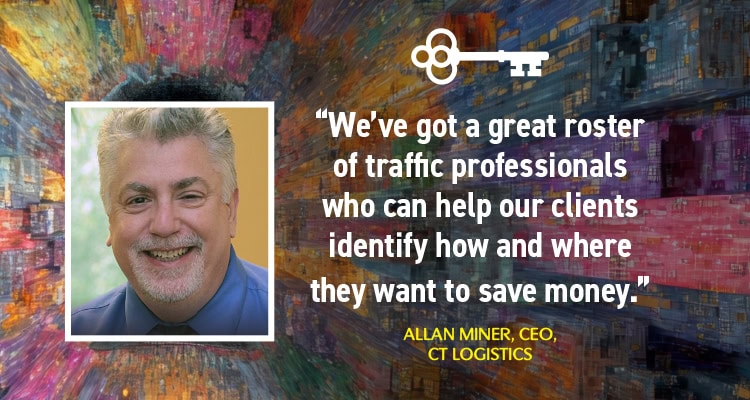
Established in 1923 as The Commercial Traffic Company, CT Logistics is one of the largest providers of freight bill auditing, business intelligence, and transportation management consulting in the country.
Over the past few years, CT Logistics’ ability to assist its clients with rate negotiations and routing guides has become especially important, given the number of workers with decades of experience in transportation and logistics who’ve left the workforce. To replace their skills, some organizations have turned to purchasing agents.
Too often, however, the agents focus primarily on obtaining the lowest cost. While costs are important, of course, it’s also critical to understand the nuances of any agreement, Miner says.
These may not initially be obvious. For example, one carrier may tout a large discount, but have a base rate that’s higher than its competitors, so that even with the discount, it’s not the most cost-effective option. “This is where CT comes in,” Miner says. “We get through the hype and get to the bottom line for our clients.”
CT Logistics created comprehensive routing guides for an Ohio-based distributor of industrial parts that operates thousands of stores across the country. Previously, decisions on carrier choice were decentralized, so each location would choose its carrier. The new guide limits carrier options to those that offer optimal pricing. The change is helping the company save millions of dollars, Miner says.
Many clients also save by implementing CT Logistics’ FreitRater® solution, which can deliver an ROI up to 10 times the service fees. The solution can crunch through numerous calculations, auditing freight bills to uncover inaccurate charges, while simultaneously taking into account the contractual discounts and negotiated rates between each shipper and carrier. FreitRater can work even with complex general ledger account code allocations down to the SKU level, and also examine product classifications for accuracy.
As tariffs have become a greater concern, CT Logistics’ professional service group can leverage FreitRater to complete “what if” comparisons that show how transportation costs will be impacted by rate changes.
Clients can also work with TranSaver, an online rating and routing solution, to quickly access the rates, transit times, and other information offered by each of their carriers. They can then decide, for instance, whether to pay more to get a shipment to its destination faster, Miner says.
Shippers that need bid transportation services can also turn to CT Logistics, which can create bid packages aimed at carriers likely to be solid partners, given the company’s history, such as the routes and volumes they typically use. “We help with the analysis, and then the shippers make the decision,” Miner says.
CT Logistics recently expanded, opening a new office in the UK, and adding new offerings, such as a single sign-on for many applications. It continues to add experienced traffic managers, too. “We’ve got a great roster of traffic professionals who can help our clients identify how and where they want to save money,” Miner says.
As CT Logistics looks to the future, it continues to build on its more than one century in business. “We’ve been doing this with integrity for 102 years, with billions of dollars of our clients’ funds going through us,” Miner says. “We’ve handled them all safely.”
CTSI-Global: Logistics Technology And Intelligence Services
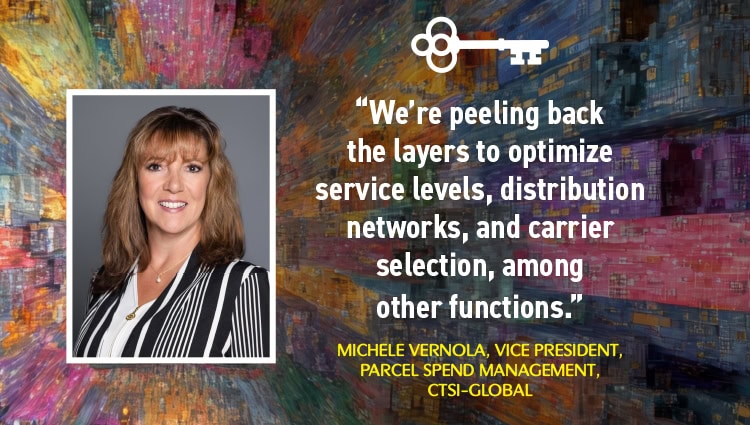
With several locations across the United States, as well as in India, Ireland, and Singapore, CTSI-Global truly operates internationally. Its freight audit services span all transportation modes and are available in more than 127 countries. Daily, the company processes six to eight million freight transactions that total more than $24 billion each year. The combined audit and analysis experience of CTSI-Global’s audit staff tops 400 years, Vernola says.
When working with clients, CTSI-Global commits to a partnership that enables it to gain a deep understanding of the company’s operations. It’s then able to provide expert insight and visibility, as well as data-driven analytics and what-if scenarios, all of which enable management to make informed decisions, Vernola adds.
The freight bill audit and payment services offered by CTSI-Global are closely intertwined with its growing focus on parcel spend management solutions. As a “self-professed parcel nerd,” Vernola has seen how both services can play crucial roles in effectively managing overall transportation costs and shipping strategies. This approach also offers valuable insight into overall supply chain operations, which companies can then use to boost performance, she says.
Hidden Cost Drivers, Uncovered
“We’re peeling back the layers to optimize service levels, distribution networks, and carrier selection, among other functions,” she says. For example, by connecting freight bill audit and payment with parcel spend management, CTSI-Global can identify hidden cost drivers, such as erroneous dimensional charges on packages.
Honeybee TMS, CTSI-Global’s customized and proprietary transportation management solution, can aid shippers with load optimization, carrier selection, and shipment execution, among other functions. Clients can link data from multiple points across their supply chains to identify and monitor changes, trends, and shipping patterns. They also can extract data from the data warehouse within Honeybee TMS to conduct their own modeling and benchmarking analysis, which can help them drive performance, she adds.
CTSI-Global partnered with a major retail company that had been using multiple freight audit providers across its global network. To streamline communication and boost efficiency, management decided to consolidate services under a single provider. The provider would also have to offer a web-based TMS portal to which the company could easily load shipment data, rate shipments, and view estimated transit times, among other features.
Technology Plus Expertise
CTSI-Global met these criteria and worked with the company on a phased rollout of its services. Among other benefits, the number of weekly carrier payments dropped from 46 to three, while the volume of invoices paid on time jumped from 78% to 96%. The company identified $4.26 million in carrier overcharges, up from $1.62 million previously.
To stay ahead of the rapidly evolving FBAP landscape, CTSI-Global actively partners with leading research organizations, engaging in monthly strategy sessions with their analysts to gain insights into industry trends, Vernola says. CTSI-Global has consistently invested in research and development, focusing on several priorities, including expanding parcel solutions, integrating greater visibility tools, and providing greater predictive analytics capabilities to deliver deeper insights and smarter decision making.
Intelligent Audit: Efficiency, Actionable Insight, and Guidance
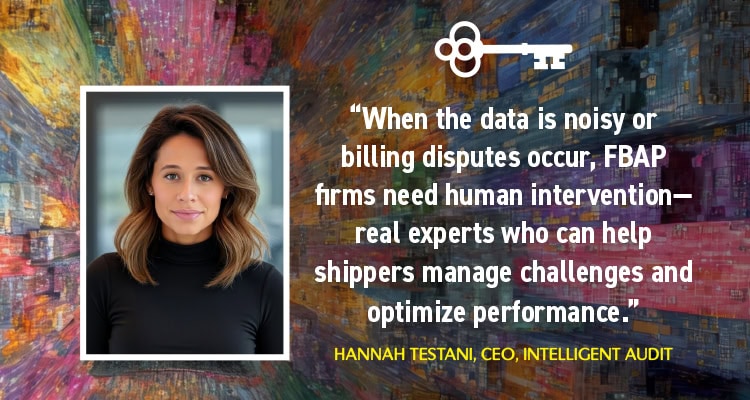
Since its founding in 1996, Intelligent Audit has continued to be a pioneer in bringing in new technologies to better serve its customers, Testani says. “Innovation is in our DNA,” she notes.
Along with a proprietary intelligence platform and sophisticated adoption of AI and automation, Intelligent Audit provides industry-leading expertise and analysis that technology alone can’t deliver. When providers offer only technology, everything works well if carriers provide accurate, complete invoices and no exceptions arise, Testani says. “But when the data is noisy or billing disputes occur, FBAP firms need human intervention—real experts who can help shippers manage challenges and optimize performance,” she adds.
By leveraging both technology and a team of industry experts, Intelligent Audit has become a global leader in multimodal freight invoice audit, business intelligence, secure, on-time carrier payments, and AI-powered tools that empower shippers to optimize their operations. Its sophisticated deep learning models (AI-powered Anomaly Detection) can become experts in the characteristics of each shipper’s shipment behavior and can quickly identify transactions that fall outside the norms. It catches shipping anomalies, including those that extend well beyond regular carrier billing issues, with a 99% accuracy rate. This tool has caught millions in fraud, and millions more in circumstantial errors.
Decisions Backed by Data
Using AI to examine transportation data both boosts productivity and enhances the process, particularly in loading transportation invoices from carriers that can’t support electronic invoices. Intelligent Audit leverages large language models, as AI can plug in missing data using the historical context it has learned, Testani says.
Another important differentiation at Intelligent Audit is the way it partners with customers to manage any exceptions with its carriers. “IA automates the dispute resolution process and is proactive in working with carriers to fix the root cause of issues to prevent them from happening again,” Testani says.
Polly, Intelligent Audit’s AI-powered chat bot, is a first resource for many customers and carriers. Polly responds to emails within 60 seconds, and if it is unable to provide an answer, an employee will step in to provide expertise. “It’s a seamless process,” Testani says.
Intelligent Audit is empowering its customers to ship smarter and make real-time decisions backed with data, including through self-serve modeling tools that shippers can leverage in scenario planning. Testani notes that especially in the parcel world, it has been difficult to compare costs between carriers, because many define even simple concepts, like a zone, differently.
“By design, it’s complex,” she says. “So we’ve created tools to help customers move quickly, make informed decisions, and optimize performance, whether that’s comparing contracts, opening or closing a distribution center, or selecting the best service for shipments,” she adds.
As important, Intelligent Audit’s experts can help shippers implement best practices based on deep industry expertise and data insights. A global manufacturer with a complex logistics network and hundreds of carrier relationships faced multiple challenges, including lengthy freight and parcel invoices that could hide high shipping costs; difficulty identifying and recovering overcharges from its many carrier partnerships; and limited visibility into optimization opportunities across modes and lanes.
Intelligent Audit’s core Freight Audit, Recovery, and BI solution, along with AI-powered Anomaly Detection, helped in multiple ways, such as identifying errors on shipment invoices and securing refunds, and flagging irregular spending patterns. Together, the solutions have generated more than $15 million in annual savings, for a return on investment of nearly 2,000%.
Intelligent Audit will continue to push the boundaries of what’s possible in supply chain performance, pairing technology with world-class expertise to help customers navigate complexity with confidence. “We’re empowering our customers to be as efficient and effective as possible,” Testani adds.
nVision Global: Optimizing Supply Chain Operations And Driving Growth

nVision Global offers a truly global reach, with processing centers and a dedicated team of seasoned professionals in more than one dozen countries throughout Europe, the Middle East, the Americas, and Asia, who provide comprehensive freight bill audit and payment services. The company also offers end-to-end supply chain solutions and Software-as-a-Service (SaaS) capabilities.
When partnering with each client, nVision strives to identify and develop the solution(s) that will most effectively address its needs, Brown says. Along with its FBAP solutions, nVision has developed electronic bidding, order management, business intelligence portals, and other solutions, many of which work together to streamline shipper operations.
“We constantly look at ways that we can improve technology and come up with more ways to automate processes, internally and externally. As a result, nVision’s freight audit services deliver hundreds of millions in savings for our customers annually,” Brown says.
Impact TMS, nVision’s global freight management solution, helps shippers plan and manage all global shipments on one platform. Working with Impact TMS, shippers can integrate all customers, suppliers, and transportation providers.
A Centralized Control Center
A large package company is leveraging Impact TMS to meet several challenges, including short delivery timelines and capacity constraints of raw materials and suppliers. To address these challenges, Impact TMS provides real-time data integration of orders, tendered rates, and tracking status, as well as a centralized logistics control center that manages online freight auctions.
nVision also worked with the company to analyze and reconfigure its distribution network so it aligned with internal goals and customer requirements. With these and other changes, the company saved more than $2 million in the first year of the partnership, largely by avoiding expedited freight costs.
Another nVision solution, nSure AI, enhances nVision’s OCR data extraction process by leveraging artificial intelligence, machine learning, and large language models. As a result, the accuracy rate of the OCR engine currently tops 99% and continues to increase, Brown says.
C2Q—Contract to Quote—is a dynamic market pricing solution that nVision recently launched. It combines real-time market intelligence, advanced analytics, and automation to transform freight pricing, bidding, and tendering into an efficient, competitive, and strategic process, all within a single platform.
C2Q allows for real-time rating based on real-time market conditions, including for spot pricing or on-demand quotes. Shippers have the flexibility to do bids and auctions to multiple providers at the same time. “C2Q supports current market conditions with real-time quotes and bids, which are all market driven,” Brown says.
While thousands of companies may offer solutions that help companies find cheaper prices for various products, they often are not service-driven. However, transportation is a service, Brown says.
These “product” solutions often fall short when companies are buying transportation services or shipping goods worth millions of dollars around the world, he says. “You need a solution focused on the transportation environment. That’s what our teams focus on, and it’s what helps us to be successful,” he adds.
nVision also offers global loss and damage claims services. These services have recovered more than $7 million in the past two years and boast an 87% recovery rate.
Another key to the company’s success is its ongoing commitment to do all it can to be the best. “That’s our focus and it comes through in our leading technology, our automation solutions, our customer service, and our hard work,” Brown says.
Trans Audit Inc.: Transparent, Comprehensive Post Payment Audits
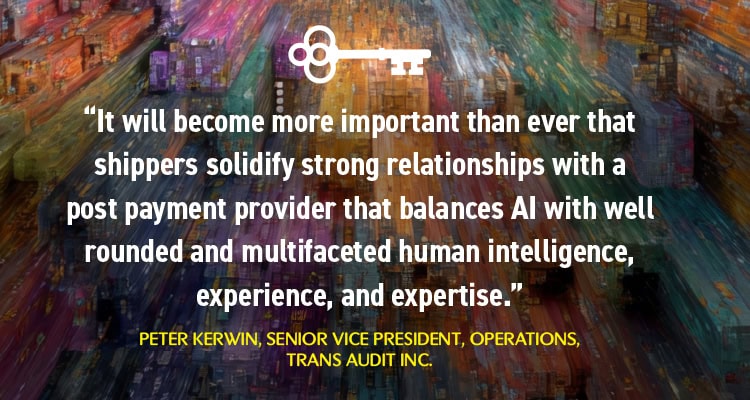
Through its emphasis on transparency and thoroughness, Trans Audit has grown into the largest and most successful specialist in global transportation post payment audits. Trans Audit offers historical and ongoing expense recovery across all modes of transportation for multiple Fortune and Global 1000 corporations from a range of industry sectors.
And because Trans Audit is privately owned, Clients are the sole focus rather than shareholders, says Funk, Senior Vice President–Sales, Marketing & Organizational Development.
Several attributes have been key to Trans Audit’s sustained success over its nearly 50 years in business. The unsurpassed emphasis on fostering collaborative and Client-centric relationships with carriers is the backbone on which Trans Audit Clients depend to maintain positive and cooperative relationships and recover the maximum refunds.
Trans Audit also employs subject matter modal experts (SMMEs) who can leverage experience from all facets of the industry. The company’s roster of SMMEs includes shippers and carriers, as well as experts in data mining and analytics. Robust diversification in analytical background and expertise ensures a comprehensive and holistic post payment audit.
Speed Meets Transparency
More than 95% of Trans Audit’s Clients utilize the services of an FBAP, so they can guarantee their invoices are rapidly processed and paid to carriers. This eliminates or greatly lessens the impact of late fees and finance charges, says Peter Kerwin, Senior Vice President, Operations. Conversely a Trans Audit post payment audit has far greater timelines to review invoices and reverse any overbillings and overpayments that are captured on the backend, he adds.
In addition to consistent refund results, Trans Audit Clients receive unparalleled audit transparency. Clients can access real-time interactive and transparent reporting dashboards on a 24/7 basis. As a result, shippers gain valuable insights into carrier billing practices and trends, which can be used to take corrective action and improve operations.
For example, a major manufacturer of beverage, food, and specialty packaging with a complex logistics network had experienced frustrating delays when working with another post payment audit provider. The shipper transitioned to Trans Audit and within 30 days, Trans Audit had completely onboarded and commenced a comprehensive post payment audit, including a meticulous analysis of invoices.
Armed with this information, the manufacturer was able to secure sizable refunds for overpayments and overbillings.
The results were so impressive that the Client broadened Trans Audit’s post payment audit engagement, so that it encompassed all transportation expenses and payment points across the company’s entire network. Because of Trans Audit’s unmatched expertise, the manufacturer gained deep visibility and substantial long term cost recoveries.
Over the next few years, it’s likely that offshoring, an over reliance on automation, and a corresponding shift away from human expertise will gain strength in the freight bill audit and payment sector, Kerwin says.
“It will become more important than ever that shippers solidify strong relationships with a post payment provider that balances AI with well rounded and multifaceted human intelligence, experience, and expertise,” he adds.
Trans Audit offers an unparalleled blend of cutting-edge technology and human insight, and will continue to dive deeply into logistics intelligence, continually strengthening its position as a premier transportation post payment audit specialist.
U.S. Bank: Trusted Freight Audit And Payment Solutions
As the nation’s fifth-largest bank, U.S. Bank is uniquely positioned to help its freight bill clients improve both operational efficiency and working capital. “We focus on delivering concrete solutions that streamline and enhance our customers’ freight billing, auditing, and payment processes,” Burglechner says.
In addition, U.S. Bank’s cash management solutions allow carriers to receive payments faster without changing payment terms. For example, U.S. Bank worked with a large multinational shipper on a customized solution to move ocean payments from indirect to direct. The shipper was able to preserve working capital and gain better control of the payment process.
By leveraging intelligent automation and trusted, high-quality data, U.S. Bank helps clients achieve greater control over all their transportation expenses. Depending on a company’s current FBAP process, the savings possible with U.S. Bank’s FBAP solutions can hit 10% in the first year. The bank also equips shippers with real-time business intelligence that enables them to make informed decisions on their own, driving smarter supply chain management, Burglechner says.
U.S. Bank’s focus on carriers, as well as shippers, is another differentiator.
“We give carriers a voice,” Burglechner says. U.S. Bank includes carriers on its Advisory Council, where they play a crucial role in helping to establish the product and development roadmap. Collaborative online tools allow shippers to quickly process, pay, and resolve exceptions, enabling them to become shippers of choice. As an active board member of the National Motor Freight Traffic Association’s Digital Standards Development Council (DSDC), U.S. Bank is helping to drive industry API standardization.
Because U.S. Bank’s solutions support positive business rule changes and a collaborative invoice approval process, they ensure shippers pay only what they owe, while carriers receive accurate, prompt payment. “Eliminating unnecessary collection expenses adds value for both parties,” Burglechner says.
As part of its ongoing investment in technology, U.S. Bank is exploring the use of AI to analyze proof-of-delivery images. This solution would determine if an associated image does in fact contain the information necessary to accurately validate information provided on the invoice.
Keeping Client Data Secure
Another way in which U.S. Bank sets itself apart is its ability to ensure data integrity and security. It continues to invest in its world-class, Tier IV data center to safeguard client information. As a federally regulated financial institution and payment provider, U.S. Bank’s audit and compliance standards far exceed those of fintech companies, Burglechner says. These steps are key, given the ongoing theft of both physical cargo and electronic data, he adds.
Over the past six years, U.S. Bank partnered with a major apparel retailer to provide freight audit and payment solutions tailored to the company’s growing needs. Within four years, initial audits of the client’s small parcel invoices uncovered cost savings that topped $10 million. The partnership between the two companies has expanded to include all the client’s North American freight and parcel invoices. Cumulative savings now exceed $100 million, Burglechner says.
U.S. Bank’s freight payment division continues to invest in solutions that boost automation, speed payments, and provide advanced analytics, empowering clients to make smarter, more proactive decisions. “Our solutions make it simpler to audit and approve transportation expenses,” Burglechner says.
